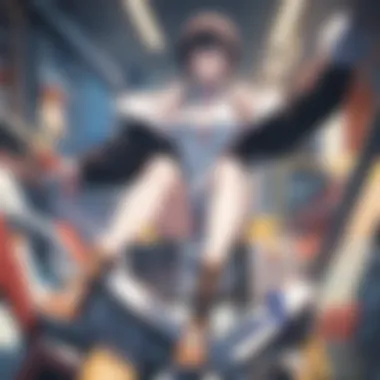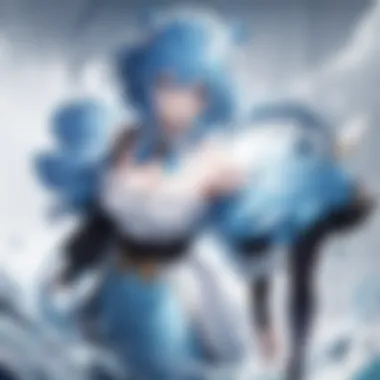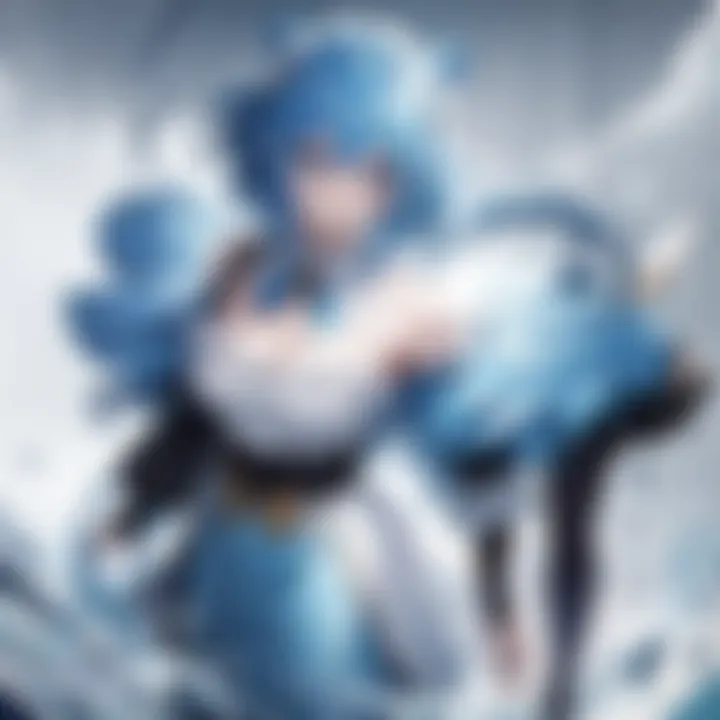Campione Episode 1: Analyzing the English Dub on Crunchyroll


Intro
The first episode of Campione! marks a significant introduction to a world blending the elements of fantasy and myth. As it unfolds on Crunchyroll, this episode presents an intriguing premise, boasting an elaborate storyline and a robust cast of characters. The English dub provides an alternative experience to viewers who may not be fluent in Japanese, thus broadening the audience for this anime. But how well does the English adaptation convey the original essence? This article aims to analyze various components of the first episode, focusing on character developments, thematic explorations, and the nuances of the localization process.
Character Analysis
Overview of Character Development
The episode primarily introduces several key characters, notably Godou Kusanagi, who becomes a Campione, a slayer of gods. His motivation and internal conflicts are established, painting him as a reluctant hero thrust into a monumental role. The first episode offers glimpses into his personality, showcasing his strength and vulnerabilities. It is critical to observe how his character evolves through the narrative arc presented.
In contrast, we meet the young heroine, Erica Blandelli. She exhibits confidence and assertiveness, serving as a foil to Godou's more introspective nature. The dynamic between these two characters sets the foundation for future interactions and is crucial in driving the plot forward.
Key Relationships and Dynamics
Interactions between Godou and the characters around him reveal deeper layers of their personalities.
- Godou and Erica: Their chemistry is vital. Erica’s assertiveness challenges Godou’s reluctance to embrace his new identity.
- Godou and his friends: This relationship shows a sense of normalcy contrasting the chaos introduced by his newfound status.
- Godou and the antagonistic deities: Set against these powerful foes, Godou's journey becomes not just personal but a battle of existential significance.
"The interplay between Godou and Erica captures the essence of conflict and growth more than merely romantic tensions."
Thematic Exploration
Central Themes and Messages
One prominent theme in the first episode is the concept of power and its consequences. Godou’s transformation into a Campione thrusts him into a realm where he must confront moral dilemmas, emphasizing the toll that great power can take on an individual. This theme resonates through the episodes as viewers witness the struggles intrinsic to wielding such profound abilities.
Another significant theme is the clash between the mundane and the mythical. As the characters navigate their daily lives, the introduction of divine elements creates a tension that propels the story forward. The show raises questions about belief, reality, and the nature of heroism.
Cultural Context and Influences
Cameione draws heavily from various mythologies, which might not be globally well-known. By localizing these elements into English, audiences may face challenges in grasping nuanced references that are pivotal to the storyline. Understanding the mythological underpinnings enhances the viewer's appreciation of the narrative's depth.
This can cause potential disconnects in cultural interpretation. To bridge this gap, the English dub must not only provide accurate translations but also effectively adapt dialogues to resonate with international audiences.
Preface to Campione
The introduction to Campione serves as a crucial foundation for understanding the series, its themes, and its characters. It sets the stage for viewers by providing context which will enhance the viewing experience. It is important to grasp the series' underlying concepts, as they influence character motivations and interactions. This section effectively bridges the gap between the viewer's initial perception of the series and the deeper intricacies that unfold throughout.
Overview of the Series
Campione is a Japanese light novel series written by Jougi Shiraishi, which has been adapted into an anime. The story centers around a protagonist who gains god-like powers after defeating a deity. This premise sets a unique backdrop for exploring themes of power, responsibility, and the consequences of wielding such great strength. The blend of fantasy elements with modern settings creates a compelling narrative that attracts viewers. The series has garnered attentions for its dynamic characters and complex story arcs, making it noteworthy.
Setting and Context
The setting of Campione is particularly important in establishing its narrative framework. It takes place in contemporary Japan, where myths and deities coexist with modern life. This interaction creates a rich tapestry for storytelling, where ordinary events can transition into epic battles with ancient gods. The locations range from bustling urban streets to traditional shrines, each adding layers to the plot. The backdrop is not merely an aesthetic choice but serves to ground the fantastical elements in reality, making the supernatural aspects more relatable.
Understanding the context surrounding these settings enhances the significance of certain events and character actions. It allows viewers to appreciate the historical and cultural references that pepper the storyline, which may not be immediately obvious. This added depth provides greater satisfaction for those who delve into the series, seeking to uncover all the nuances.
Episode One Synopsis
The synopsis of Episode One is a vital section of this article. It establishes the foundation for understanding the series as a whole. This segment offers a comprehensive overview of the episode's key elements. Through the exploration of the plot and characters, readers gain insights into the narrative structure and thematic concerns that the show presents. Moreover, by dissecting the episode, fans and newcomers alike can appreciate the nuances in story crafting that Campione employs. This analysis will also enhance the connection to the subsequent sections regarding character development and thematic elements.
Plot Summary
Episode One introduces viewers to the complexities of the world of Campione, focusing on its protagonist, Godou Kusanagi. It begins with a chaotic scene where Godou faces a formidable opponent, a Campione, or "God Slayer." The series sets a tone of action mixed with philosophical questions regarding power and responsibility. The introduction sprinkles in elements of the supernatural, forcing Godou into a battle that challenges both his physical and mental limits.
As the episode unfolds, Godou receives new abilities connected to the Campione he has just defeated. This pivotal moment shifts the narrative, thrusting him into conflicts that carry significant weight in the supernatural hierarchy. The pace is brisk, allowing the viewer to quickly absorb character motivations and situational stakes. The plot does not dwell long on expository beats, instead favoring rapid progression filled with tension.


This episode effectively sets up future conflicts and character dynamics, hinting at complex relationships that will develop over time. Audience engagement is propelled by high-stakes scenarios that challenge Godou, making it clear that his journey is far from simple.
Key Characters Introduced
In the first episode, several key characters emerge alongside Godou Kusanagi. The initial character introductions play a significant role in framing the story's dynamics.
- Godou Kusanagi: The protagonist, thrust into the world of Campione. His character arc revolves around his struggle with the newfound responsibilities of being a Campione.
- Erica Blandelli: A prominent supporting character who serves a dual role as both an ally and a mentor. Her motivations and complex background are hinted at, setting the stage for deeper interactions.
- Liliana Kranjčar: Another important character, she represents the traditional approach toward supernatural beings. Her interactions with Godou offer insights into the existing power dynamics.
Each character is carefully crafted, leaving breadcrumbs of their personalities and motivations for the audience to explore in later episodes. This narrative strategy creates anticipation for character development, essential for keeping viewers engaged throughout the series.
The character introductions in Episode One are not just mere plot devices; they serve as anchors for upcoming thematic exploration in the series.
In summary, Episode One adeptly sets the stage for Campione's unfolding drama, ensuring that both plot and character development are tightly interwoven.
Exploring Character Development
Understanding character development in an anime series like Campione is essential. It allows viewers to form a deeper connection with the story and its characters. This connection often enhances the emotional impact of the narrative. Analyzing how characters evolve over time reveals their motivations and challenges. This exploration also aids in appreciating the writers' efforts to create compelling arcs.
Character development significantly contributes to the overall strength of the story. It not only entertains but also reflects human experiences. Viewers can see parts of themselves in the characters, making the experience relatable. Specifically, in Campione, the protagonist and supporting characters each have unique attributes, influencing their interactions and the plot's progression. Through this lens, we can gain insights into the dynamics at play in the first episode.
Protagonist Analysis
The protagonist, Godou Kusanagi, is introduced in a complex and intriguing manner. He is depicted as a high school student thrust into a world of deities and supernatural powers. This duality of being an ordinary boy and a powerful individual creates a compelling character journey.
Godou’s initial reactions to his new reality reveal his layers. In navigating this foreign world, he grapples with his sense of identity and purpose. This predicament resonates with viewers who have faced moments of uncertainty in their lives. His character development is crucial in setting the tone for future episodes.
Notably, Godou's conflicts are not just external but internal as well. He struggles to manage the expectations of being a Campione while holding onto his past life. Through his journey, viewers witness his growth, from hesitant to more decisive, aligning with the series' themes of power and responsibility.
Supporting Characters
Supporting characters play an integral role in enriching the narrative around Godou. First, we meet Erica Blandelli, a highly skilled warrior with her agenda. Her assertiveness contrasts with Godou's uncertainties, serving as a catalyst for his character growth. Erica's depth adds another layer of complexity, pushing Godou to confront the reality of being a Campione.
Another essential character is Liliana Kranjcar. Liliana represents loyalty and traditional values. Her interactions with Godou and Erica highlight differing priorities. This conflict adds tension and layers to their relationships. Each supporting character introduces varied dynamics that challenge Godou, ultimately shaping him.
As viewers dive deeper into the characters' backgrounds, they will notice thoughtful design in their relationships and roles. This adds richness to the plot and fosters a robust narrative structure that is crucial for any acceptance and engagement with the show.
Thematic Elements in Episode One
The analysis of thematic elements in the first episode of Campione is crucial for understanding the series' narrative depth and character motivations. This exploration enhances viewers' comprehension of the underlying messages and societal reflections within the anime. The themes revealed in this episode not only serve to engage the audience but also provide a framework for character development and their relationships as the series progresses. In this section, we'll define the core themes presented, as well as the symbolism and motifs that enrich the storytelling.
Core Themes
The first episode introduces several pivotal themes that resonate throughout Campione. One prominent theme is the battle between personal desire and societal responsibility. The protagonist, Godou Kusanagi, finds himself facing a world where his actions can influence the balance between the mundane and the supernatural. This theme is articulated through his interactions with the deities and the expectations placed upon him as a Campione. The struggle for identity is also central to this narrative. Godou grapples with the newfound powers he holds, questioning who he is versus who he needs to become.
Another significant theme is the concept of heroism. In Campione, heroism is not portrayed as a simple matter of defeating evil. Rather, it involves making difficult choices that can have far-reaching consequences. This complexity is painted vividly in Godou's character arc, as he is propelled into conflicts that demand not only strength but also moral fortitude. The interplay of individual actions and larger societal impacts forms a recurrent narrative thread that is essential for viewers to recognize.
Symbolism and Motifs
The symbolism in the first episode serves to deepen the audience's engagement with the story. One major motif is the sword, which embodies strength and conflict. Godou's use of his sword becomes a physical representation of his struggles—both with external foes and his internal dilemmas. The sword symbolizes not merely violence but also the burden of responsibility associated with wielding such power.
Additionally, the motif of light versus darkness recurs throughout the episode. Light typically signifies protection and knowledge, while darkness embodies danger and uncertainty. Godou's journey is marked by encounters with both elements, reflecting his ongoing quest for balance in an increasingly chaotic world.
"The thematic depth in Campione provides not just entertainment but also a lens to view complex human experiences."
Exploring these themes offers insights that resonate with a broader context, encouraging a deeper connection with the narrative. Themes in anime often reflect the cultural and existential queries of the times, making their examination essential for a commendable understanding of the medium. To summarize, the thematic elements in Campione not only motivate the plot but also enrich the character dynamics, weaving a narrative tapestry that resonates with audiences.
The English Dub: An Overview
The English dub of Campione is a crucial element in making the series accessible to a wider audience. Understanding the dub is essential for viewers who prefer English-language adaptations over the original Japanese audio. It allows for an appreciation of how cultural nuances and character expressions translate across languages. In this section, we focus on distinct aspects of the dubbing process, the voice cast, and their performances, which can significantly impact viewers’ experiences.


Dubbing Process Explained
The dubbing process is more than just translating lines from Japanese into English. This task involves careful consideration of lip-syncing, cultural context, and maintaining the show's original tone.
Voice actors must bring characters to life, emulating the studied emotion and intentions of the original performances. Translators play a key role in this process. They take not just the words but also the essence of the dialogues to craft a script that fits the English language. This requires a balance between staying true to the source material and making it relatable for the target audience. Sometimes, cultural references may not translate directly, making it necessary for the adaptation to provide context or alternatives that resonate with English-speaking viewers.
The ability to capture the original intentions of the series enhances viewer engagement. When done well, an English dub allows viewers to immerse fully in the narrative, without the distraction of reading subtitles. In Campione, the dubbing is designed to cater to both fans of the genre and new viewers alike, making it essential to analyze.
Voice Cast and Performances
The voice cast for the English dub plays a significant role in shaping the character dynamics and overall atmosphere of Campione. The selected actors bring their unique skills to the table, influencing how audiences perceive each character.
Each voice actor takes on the responsibility of delivering lines in a way that resonates emotionally, enhancing character development. For instance, the protagonist’s voice must encapsulate their growth throughout the series, provoking empathy from the audience. Conversely, supporting characters each have distinct traits that are conveyed through varied voice inflections and tones, helping to build a comprehensive world.
Some notable performances include:
- Protagonist: Voice actor’s portrayal of the lead can dictate the overall reception of the character.
- Supporting Roles: Each supporting character contributes layers to the overall story, which actors skillfully navigate to showcase their complexities just like in the original.
The quality of performances directly affects how viewers connect with the material. Strong performances can elevate the narrative and make certain scenes more impactful than they would otherwise be. It is particularly important in the first episode, where characters are introduced and set the tone for their arcs.
"A well-executed dub can change the way viewers receive a story, making it essential to assess voice performances when discussing adaptations."
In summary, the English dub of Campione is an essential lens through which audience can engage with the series. Every detail in the dubbing process and every choice made by the voice cast collectively shapes viewer experiences, determining the success of the adaptation.
Quality of the English Dub
The quality of an English dub can significantly impact how the audience perceives an anime series. With Campione, the English dub has gained attention for its unique approach to localization and character representation. Audiences often have high expectations, which makes the analysis of this dub essential. This section delves into crucial elements that affect the overall quality, highlighting both the benefits and considerations inherent in the dubbing process.
Dubbing Accuracy and Localization
Dubbing accuracy refers to the fidelity of the translation from the original Japanese dialogue to the English version. In the case of Campione, the challenge lies in maintaining the essence of the source material while making it accessible to English-speaking audiences. This process involves not just direct translation but also cultural adaptation to ensure that humor, emotional depth, and nuance resonate with the new demographic.
Localization considers cultural context. Certain phrases or expressions in Japanese may not have direct English equivalents. The dub’s success hinges on the ability to convey similar feelings or implications. For instance, wordplay or idiomatic expressions might be altered or replaced with culturally relevant terms that maintain the story's integrity. This balance is what can enhance viewer immersion and understanding.
Comparative Analysis with the Original
A comparative analysis of the English dub with the original Japanese audio highlights key differences and similarities. First, the voice acting in each version can influence character perception. The original cast may deliver performances that feel more authentic to the show’s cultural backdrop. In contrast, the English dub actors must convey emotions consistently while also sounding natural speaking English.
Additionally, viewers may notice variations in dialogue delivery. Some scenes may have altered pacing to fit the dubbed version, affecting the tension and rhythm of the story. Occasionally, there are changes in dialogue to ensure clarity or flow, which can sometimes lead to differing interpretations of character motivations.
Overall, understanding these nuances contributes to a deeper appreciation of how Campione adapts its narrative for a broader audience. By evaluating both versions critically, viewers can better understand the implications of localization in anime.
"The dub should serve the characters and story, not override them. This is a delicate balance that every localized version must navigate."
Consequently, the quality of an English dub is not simply about translation; it also encapsulates performance, cultural nuance, and audience reception—all pivotal elements in the success of Campione's adaptation.
Viewer Reception and Critique
Understanding the viewer reception and critique of an anime episode is vital for multiple reasons. It provides insights into how the audience connects with the material and evaluates the adaptation choices made by the localization teams. Viewer opinions often reflect the community's collective experience, which can influence the future of similar adaptations. For Campione, analyzing reception helps to emphasize the impact of cultural shifts in the dubbing process. It also highlights how well the English dub aligns with expectations based on the original Japanese version. This analysis allows fans, newcomers, and industry professionals to glean lessons on audience engagement and the effectiveness of localization strategies.
Audience Feedback
Viewer feedback on Campione Episode 1 has been mixed, showcasing a variety of perspectives. Many fans appreciated the effort put into the English dub, noting how voice performances captured the essence of the characters. Specifically, characters like Godou Kusanagi resonated well due to an enthusiastic portrayal. However, some viewers expressed concern over certain nuances being lost in translation, particularly humor and cultural references, which they felt could lead to misunderstandings in the story's context.
Social media platforms and forums, such as Reddit, have become hubs for such discussions. Here, fans analyze voice acting, dubbing choices, and cultural implications, which opens up dialogues about their satisfaction and disappointment. Unpacking these sentiments sheds light on the overall acceptance of the adaptation. It is essential to note how audience feedback can guide future localization efforts in ensuring they are respectful and true to the source material.
Critical Reception Analysis
The critical reception of Campione Episode 1 presents a structured approach to evaluating its quality. Critics often point to various aspects such as voice acting, script accuracy, and emotional delivery. Reviews highlight a significant positive note on the meticulous work behind translating the series. Publications and critics on platforms like MyAnimeList emphasize how character emotions were effectively conveyed through the voice actors, enhancing viewer immersion.


Nonetheless, some critiques focus on the pacing, which they argue dilutes character development and plot progression. These reviews suggest that, although the dubbing is well-executed, it sometimes fails to create a coherent narrative flow as perceived by the audience. Furthermore, critical analysis often includes comparisons with other successful anime dubs, offering insight into areas where Campione can improve.
Overall, gathering feedback from both audiences and critics provides a comprehensive understanding of how Campione Episode 1 is received. It allows for a critique that combines both personal opinions and professional assessments, which can ultimately frame future expectations for the series.
"The viewer's response is as vital as the initial creation, for it renders a dialogue that shapes future productions.”
By bridging these analyses, one can better appreciate the chorus of opinions that shape the perception of the show, guiding its journey through the anime community.
Cultural Considerations in Dubbing
Cultural considerations in dubbing play a critical role in ensuring that the intended message, humor, or emotional gravity of the original content resonates with a wider audience. For a series like Campione, which draws heavily from myth and cultural references specific to its Japanese roots, these considerations are paramount. Successful localization goes beyond mere translation of dialogues; it includes an understanding of social customs, idiomatic expressions, and cultural contexts that might not be immediately apparent to an English-speaking audience. Without these considerations, viewers may miss the depth and richness of the story.
Understanding Cultural Nuances
When localizing an anime series, translators and voice actors must be adept at identifying and conveying cultural nuances embedded in the characters’ dialogues and situations. Certain phrases, jokes, or scenarios may carry significant weight in Japanese culture but might have no direct equivalent in English. For instance, references to local folklore or tradition can be subtle yet essential in shaping character motivations and plot developments.
Translators must find equivalent expressions that preserve the source's original tone and intent. Failure to do so can lead to misunderstandings or a diminished viewing experience. Some examples include:
- Idioms and Sayings: Japanese has many unique idioms that may not translate directly into English. For example, any idiomatic phrase relying on Japanese culture may need a thorough reworking to make sense for Western viewers.
- Social Hierarchies: Understanding honorifics and how character relationships convey respect or familiarity is crucial. The absence of similar structures in English can lead to misleading interpretations of character dynamics.
This understanding builds a bridge for audiences, allowing them to engage more profoundly with the narrative.
Implications for Localization
The implications for localization are significant. A failure to address cultural elements can result in a product that feels disconnected from its source material. For Campione’s English dub, the localization team faced the task of ensuring that the core themes of gods, battles, and personal growth were presented in a relatable manner for English-speaking audiences. This involved:
- Adjusting Humor: Humor often does not translate well across cultures. Localizers may rework comedic lines to fit Western sensibilities without losing the essence of the humor in the original.
- Cultural References: Localizing specific references to Japanese culture involves finding something comparable that would resonate with the audience. This can require creative liberties while maintaining authenticity.
- Character Reactions: The way characters express emotions or react in situations is influenced by cultural norms. Adaptation might be necessary to ensure reactions feel natural to the target audience.
In summary, cultural considerations in dubbing enhance the viewing experience. They bridge the gap between cultures, making the content accessible and meaningful to wider audiences. By successfully navigating these considerations, Campione’s dub on Crunchyroll provides a richer, more engaging experience for viewers.
Future Episodes: Expectations
The concept of future episodes carries significant weight in any anime series. It shapes viewer anticipation and sets the standard for storytelling continuity. For Campione, subsequent episodes promise not only character development but also deeper exploration of the themes introduced in Episode 1. This section delves into what fans might expect, focusing on character arcs and thematic progressions that will resonate throughout the series.
Anticipated Character Arcs
In Episode 1, we meet key individuals whose motivations and backgrounds hint at complex narratives. The protagonist, Godou Kusanagi, captures interest with his everyday boy persona thrown into extraordinary circumstances. As viewers engage with his journey, they will likely witness a transformation. Godou's encounters with divine beings and his newfound responsibilities as a Campione will be pivotal.
Other characters, such as Erica Blandelli, may evolve from mere support roles into essential components of the story. Her initial depiction as a seemingly confident figure suggests layers that could unravel in future episodes. Keeping an eye on these journeys allows for rich discussions around how relationships and challenges shape personal growth.
- Godou's struggle with newfound powers.
- Erica's loyalty tested by her ambitions.
- Supporting characters revealing pasts that connect to current events.
The depth of character arcs not only enhances the narrative but also connects viewers emotionally, ensuring investment in their journeys.
Thematic Developments
The first episode introduces themes that are likely to develop in later installments. Concepts such as identity, responsibility, and the clash between mundane life and extraordinary challenges are foundational. As the plot advances, these themes may intertwine, leading to a broader narrative that explores what it means to hold immense power while navigating personal dilemmas.
- Identity: Godou's transition from a normal student to a Campione raises questions about self-discovery.
- Responsibility: The burden of power is a classic theme; future events will likely challenge Godou's resolve.
- Conflict: Anticipating external conflicts that will test values and relationships, which is crucial for unveiling deeper character insights.
These thematic developments invite viewers to reflect on their own experiences amidst fantasy, fostering a deeper analysis of the series beyond plot points alone.
"Understanding the characters’ growth and thematic depth in consecutive episodes enriches the viewer's experience, making the narrative engaging beyond superficial entertainment."
Culmination
Understanding the nuances of the English dub of Campione Episode 1 is vital for several reasons. The analysis reveals how localization touches various aspects of anime, influencing both character perception and thematic understanding. By embracing dubbing quality and viewer reception, one can appreciate the complexity within adaptations. This exploration illustrates the role of language in conveying cultural subtleties, which impacts audience engagement.
Summary of Key Points
- The first episode introduces key characters and conflict.
- Dubbing quality varies and affects viewer experience.
- Cultural context is essential to grasp character motivations and themes.
- Feedback from audiences highlights diverse opinions on voice performances.
Final Thoughts on Episode One
Campione's initial episode sets a solid foundation for character arcs and thematic developments. The English dub serves as a crucial bridge to understand these elements for non-Japanese speaking audiences. While variations may exist between the dub and original, both versions contribute uniquely to the narrative. This divergence is necessary to cater to different viewer preferences, ultimately enriching the anime landscape. Enthusiasts should engage critically with these adaptations, applying insights gained from episodes like this one to enhance their viewing experience.















